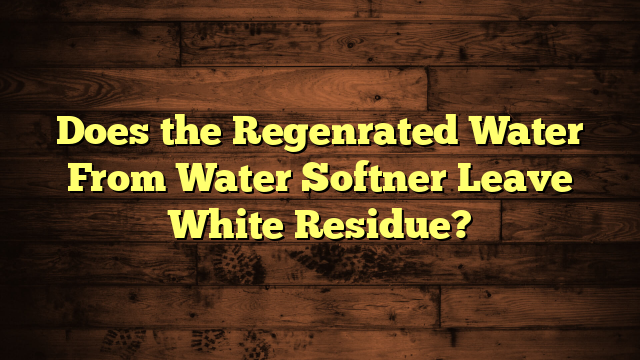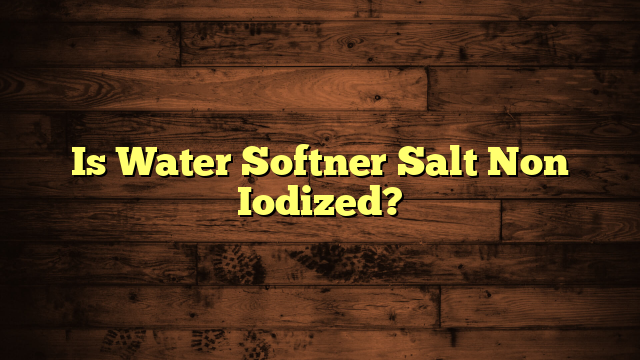Is It Ok to Not Have a Water Softner?
Choosing to have a water softener, choosing to embrace hard water, or choosing to ignore the issue entirely are all valid paths. You might find that hard water suits your lifestyle, providing minerals and a taste you enjoy. Yet, have you noticed any scale buildup or skin irritations? These concerns could indicate that the absence of a water softener may not be as beneficial as it seems. Understanding the implications of your choice can lead to a more informed decision that affects not just your plumbing but your overall health.
Key Takeaways
- Not having a water softener is acceptable if hard water doesn't significantly impact your plumbing or appliances.
- Some people prefer the taste and mineral content of hard water for health benefits and beverage flavor.
- Hard water can lead to scale buildup, but regular maintenance may mitigate appliance issues without a water softener.
- Individuals with sensitive skin may benefit from soft water, but hard water is generally safe for health.
- Evaluate your household's specific needs and preferences to determine if a water softener is necessary for you.
Understanding Hard Water
Hard water is a common issue many homeowners face, and it can sneak up on you without warning. This phenomenon occurs when your water supply contains high concentrations of hard water minerals, primarily calcium and magnesium. These minerals often originate from natural sources such as groundwater, which filters through limestone and chalk deposits. As the water travels, it picks up these minerals, leading to the hard water you may experience at home.
You might notice signs of hard water through scale buildup in appliances, soap scum in sinks, or dull laundry. These hard water sources can vary depending on your geographical location. For example, if you live in an area with a high mineral content in its geological formations, you're likely to encounter harder water.
Understanding hard water is essential because it affects not only your plumbing and appliances but also your skin and hair. While hard water isn't harmful to your health, the accumulation of hard water minerals can cause significant wear and tear over time.
Recognizing these factors can help you decide whether a water softener is necessary in your home.
Benefits of Hard Water
While many homeowners focus on the drawbacks of hard water, it's important to acknowledge that it can offer certain benefits. One of the most notable advantages is its mineral content, which can include calcium and magnesium. These minerals are essential for your body, contributing to bone health and possibly even cardiovascular health.
So, when you drink hard water, you might actually be boosting your nutrient intake.
Additionally, many people appreciate the taste of hard water. The presence of minerals can enhance the flavor, making it more invigorating compared to soft water, which often lacks this characteristic.
Some find that the unique taste of hard water can improve the enjoyment of beverages like coffee and tea, as the mineral content can influence the extraction of flavors.
Moreover, hard water can be beneficial for your garden. The minerals can promote healthy plant growth, giving your flowers and vegetables a natural boost without the need for additional fertilizers.
Drawbacks of Hard Water
While hard water may have its benefits, it also poses significant drawbacks.
You might notice that your appliances suffer from mineral buildup, leading to costly repairs or replacements.
Furthermore, skin irritation can become a concern, as hard water can strip natural oils and lead to dryness or discomfort.
Appliance Damage Risk
The damage that hard water can inflict on your appliances is a significant concern for many homeowners. When mineral buildup occurs, it can lead to costly repairs or replacements. Here's a quick overview of the potential risks associated with hard water:
| Appliance | Damage Caused | Appliance Maintenance Tips |
|---|---|---|
| Dishwasher | Clogs from mineral deposits | Regularly clean filters and spray arms |
| Washing Machine | Reduced efficiency and lifespan | Use descaling agents periodically |
| Water Heater | Limescale buildup can cause leaks | Insulate and flush regularly |
Ignoring these issues may seem easier, but it can lead to expensive consequences. While water filtration solutions like water softeners can mitigate these risks, maintaining your appliances is essential, especially if you decide against a softener.
To prolong the life of your appliances, consistently follow appliance maintenance tips, such as descaling and cleaning, to prevent hard water-related damage. By being proactive, you can save money and guarantee your appliances function efficiently, even in hard water conditions.
Skin Irritation Issues
Hard water doesn't just impact your appliances; it can also affect your skin. When you wash with hard water, the high mineral content, particularly calcium and magnesium, can disrupt your skin's natural moisture balance. This disruption often leads to increased skin sensitivity and irritation.
If you notice that your skin feels dry, itchy, or tight after showering, hard water might be the culprit. The minerals in hard water can leave a residue on your skin, preventing moisture from being absorbed. As a result, you might find yourself using more lotion or moisturizer to combat dryness, which can become a frustrating cycle.
Moreover, those with existing skin conditions, such as eczema or psoriasis, may experience exacerbated symptoms due to the harshness of hard water.
It's crucial to pay attention to how your skin reacts after using hard water. If you find that irritation persists, consider installing a water softener or exploring alternatives to maintain your skin's health.
Advantages of Soft Water
Soft water offers several benefits that can enhance your daily life.
You'll notice improved skin health, as soft water doesn't leave behind the irritating minerals found in hard water.
Moreover, using soft water can extend the lifespan of your appliances and reduce your soap usage, making it a practical choice for your home.
Improved Skin Health
Many people notice a remarkable difference in their skin health when they switch to soft water. Unlike hard water, which contains high levels of minerals like calcium and magnesium, soft water is gentler on your skin. This difference can greatly impact skin hydration. Soft water allows for better moisture retention, meaning your skin can maintain its natural barrier more effectively.
When you wash your face or shower, soft water doesn't strip away the skin's natural oils as harshly as hard water does. This gentle cleansing action helps prevent dryness and irritation, leaving your skin feeling softer and more supple. Many individuals report reduced dryness, fewer breakouts, and an overall improvement in skin texture after changing to soft water.
Moreover, soft water can enhance the effectiveness of soaps and shampoos, requiring less product for a satisfying clean. This not only benefits your wallet but also reduces the likelihood of skin reactions to harsh detergents.
Longer Appliance Lifespan
When it comes to the longevity of your household appliances, using soft water can greatly extend their lifespan. Hard water contains minerals like calcium and magnesium that can accumulate within your appliances, leading to scale buildup. This buildup can hinder their performance and ultimately cause breakdowns, resulting in costly repairs or replacements.
By opting for soft water, you're reducing the need for frequent appliance maintenance. Soft water allows appliances like dishwashers, washing machines, and water heaters to operate more efficiently. Without scale, these appliances run smoother, consuming less energy and prolonging their effective life. This not only translates to immediate savings on utility bills but also enhances the longevity benefits of your appliances.
Moreover, soft water can prevent the corrosion of internal components, which is a common issue caused by hard water. By minimizing wear and tear, you're ensuring that your appliances remain functional for a much longer period.
Reduced Soap Usage
One of the notable advantages of using soft water is its ability to considerably reduce soap usage. When you switch to soft water, you'll notice that it enhances soap efficiency. Hard water contains minerals like calcium and magnesium, which react with soap, forming soap scum that diminishes its effectiveness.
Soft water, on the other hand, allows soap to lather better, meaning you'll need less product to achieve the same cleaning results. This reduction in soap usage isn't just beneficial for your wallet; it's also great for eco-friendly cleaning.
Using fewer soaps and detergents minimizes the chemicals released into the environment, promoting a healthier ecosystem. Furthermore, when you use less soap, you'll contribute to less water pollution, as fewer residues enter wastewater systems.
In addition, the enhanced cleaning power of soft water means you're likely to spend less time scrubbing and more time enjoying your clean spaces. Overall, the shift to soft water can lead to substantial savings and a more sustainable approach to cleaning, allowing you to effectively manage household tasks while being mindful of the environment.
Disadvantages of Soft Water
Soft water, while often praised for its benefits, comes with several notable disadvantages that can impact daily life. One major drawback is its lack of vital minerals, like calcium and magnesium, which are often stripped away during the softening process. This can affect your body's mineral absorption, leading to potential deficiencies over time. If you're relying solely on soft water for drinking and cooking, you might be missing out on these significant nutrients.
Moreover, soft water can lead to a slippery feeling on your skin when bathing, which some people find uncomfortable. This is due to its lower mineral content that alters the way soap interacts with your skin, creating a slick residue.
In addition, appliances can suffer if you switch between soft and hard water. The variations might cause scaling in some devices, affecting their efficiency and lifespan.
Lastly, soft water tends to be more corrosive than hard water, which can lead to plumbing issues over time. While soft water benefits like reduced soap usage are appealing, it's important to weigh these disadvantages to determine what's best for your household.
Health Implications
The health implications of not having a water softener can be significant, especially if you rely on hard water for your daily needs. Hard water contains high levels of minerals like calcium and magnesium. While these minerals are essential for your body, an imbalance can lead to health risks. For instance, excessive calcium intake can contribute to kidney stones or calcification in arteries. If you're already consuming a diet rich in these minerals, hard water might push your intake beyond recommended levels.
Furthermore, hard water can affect your skin and hair. It may exacerbate conditions like eczema or psoriasis, as the minerals can strip away natural oils. This can leave your skin feeling dry and irritated.
In addition, using hard water for bathing can lead to buildup on your skin, which might clog pores and lead to acne.
You might also notice that hard water affects your hydration. If the water's mineral content alters your taste preferences, you may drink less water, impacting your overall hydration and mineral balance.
Ultimately, while hard water isn't inherently dangerous, it's vital to understand how it can affect your health when consumed regularly.
Cost Considerations
Investing in a water softener can seem challenging when evaluating your household budget. You'll need to weigh the initial installation expenses against the potential long-term benefits. While the upfront cost might be significant, it's vital to take into account ongoing maintenance costs and how they fit into your financial planning.
Here are some key cost factors to keep in mind:
- Installation Expenses: The price for professional installation can vary based on the complexity of your plumbing system.
- Maintenance Costs: Regular maintenance, including salt replacement and system checks, adds to your yearly expenses.
- Utility Bills: Softened water may lead to lower energy bills, as it can enhance the efficiency of your appliances.
- Replacement Parts: Over time, you may need to replace certain components, which can incur additional costs.
- Longevity of Appliances: Using a water softener can prolong the life of your plumbing and appliances, potentially saving you money on repairs and replacements.
Ultimately, it's important to analyze these costs carefully. You might find that investing in a water softener is a worthwhile expense that pays off over time.
Making an Informed Decision
When considering whether to install a water softener, it's important to evaluate both the financial implications discussed earlier and the broader impact on your lifestyle. You need to assess your water quality and how it affects your daily activities. Hard water can lead to mineral buildup in pipes and appliances, which may increase maintenance costs over time.
On the other hand, some people prefer the taste and feel of hard water, arguing that it's more natural. Your personal preference plays an essential role in this decision. If you enjoy the texture of hard water for cooking and drinking, you might lean towards forgoing a softener.
Additionally, consider the environmental impact. Water softeners often use salt, which can affect local ecosystems. Balancing these factors will help guarantee you make an informed choice.
Ultimately, the decision should reflect your priorities—whether it's improving water quality, minimizing costs, or aligning with your personal preference.
Take the time to weigh these elements carefully, as the right choice will serve your home and lifestyle effectively in the long run.
Frequently Asked Questions
Can Hard Water Damage Plumbing Fixtures Over Time?
Yes, hard water can damage plumbing fixtures over time. Mineral buildup contributes to plumbing corrosion, reducing fixture lifespan. Regular maintenance and monitoring can help mitigate these effects, ensuring your plumbing remains functional and efficient.
How Can I Test My Water Hardness at Home?
To test your water hardness at home, you can use a water testing kit. Compare the results against a hardness scale to determine how hard your water is and whether you need any adjustments.
Are There Specific Appliances That Require Soft Water?
Certain appliances, like dishwashers and water heaters, thrive on soft water. You'll notice improved appliance maintenance and longer lifespans, enhancing your water quality. Hard water can leave behind mineral buildup, leading to inefficiency and costly repairs.
What Alternatives Exist to Traditional Water Softeners?
You can consider alternatives like magnesium chloride or potassium salts for reducing hardness without traditional water softeners. These options can effectively improve water quality while being gentler on your plumbing and appliances, ensuring peak performance.
Does Hard Water Affect Hair and Skin Health?
Did you know over 85% of U.S. households have hard water? The minerals in hard water can lead to hair damage and skin dryness, affecting your overall health and appearance, making proper care essential.
Conclusion
Ultimately, whether to install a water softener is like choosing between a glass of fresh mountain spring water or a refined, smooth blend. Both have their merits. If hard water doesn't hamper your daily life, embracing its mineral-rich essence may suit you just fine. However, if you start noticing signs of wear and tear on your plumbing or skin, consider the softening option. Weigh your choices carefully, and let your home's needs guide your decision.







